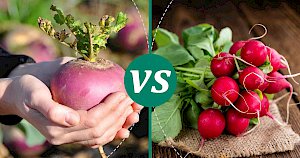Radish vs Turnip: Nutrition Comparison
Where is more calories, protein, carbs - what is more healthy?


Turnip vs Radish: Nutrition Comparison
| per 100g | Radish | Turnip |
|---|---|---|
| Calories | 16 | 28 |
| Carbohydrates | 3.4 g | 6.43 g |
| Fat | 0.1 g | 0.1 g |
| Dietary fiber | 1.6 g | 1.8 g |
| Protein | 0.68 g | 0.9 g |
| Calcium | 25 mg | 30 mg |
| Iron | 0.34 mg | 0.3 mg |
| Magnessium | 10 mg | 11 mg |
| Potassium | 233 mg | 233 mg |
| Sodium | 39 mg | 39 mg |
| Zink | 0.28 mg | 0.27 mg |
| Vitaminium B2 (riboflavin) | 0.039 mg | 0.03 mg |
| Vitaminium B3 (Niacin) | 0.254 mg | 0.4 mg |
| Vitaminium B6 | 0.071 mg | 0.09 mg |
| Vitaminium B9 (Folic acid) | 25 mg | 15 mg |
| Vitaminium C | 14.8 mg | 21 mg |
| Vitaminium K | 1.3 mg | 0.1 mg |
Less Calories in Radish
At first glance, you can see that in radish is much less calories than in turnip.
Radish has 16 kcal per 100g and turnip 28 kcal per 100g so it is pretty easy to calculate that the difference is about 75%.
In radish and in turnip most calories came from carbs.
See tables below to compare radish with turnip in details.
Radish And Turnip Nutrition Difference
- Calories:
turnip - 75% more than radish - Carbohydrates:
turnip - 89% more than radish - Fat:
turnip - 0% more than radish - Dietary fiber:
turnip - 13% more than radish - Protein:
turnip - 32% more than radish
Less protein in radish
It is aslo easy to see see that in radish is less protein than in turnip.
There is 0.9g per 100g of turnip and 0.68g per 100g of radish so using simple math we can see that difference is about 32%.
Less carbohydrates in radish
In radish is less carbohydrates than in turnip.
There is 6.43g/100g of carbohydrates in turnip and 3.4g/100g in radish so let me do the math for you again - difference is about 89%.
The same amount of fats
There is the same amount of fat in radish and turnip - 0.1g/100g.
Radish
16kcal- Calories16
- Carbohydrates3.4 g
- Fat0.1 g
- Dietary fiber1.6 g
- Protein0.68 g
100g | ounce | single piece | handfull | bunch | cup | sliced
Calories source
- 79% CARBS.
- 16% PROTEIN
- 5% FAT
Turnip
28kcal- Calories28
- Carbohydrates6.43 g
- Fat0.1 g
- Dietary fiber1.8 g
- Protein0.9 g
100g | ounce | single piece | cup | half cup
Calories source
- 85% CARBS
- 12% PROTEIN
- 3% FAT
Vitamins: turnip vs radish
- Vitaminium B2 (riboflavin):
radish - 30% more than turnip - Vitaminium B3 (Niacin):
turnip - 57% more than radish - Vitaminium B6:
turnip - 27% more than radish - Vitaminium B9 (Folic acid):
radish - 67% more than turnip - Vitaminium C:
turnip - 42% more than radish - Vitaminium K:
radish - 1200% more than turnip
Minerals: radish vs turnip
- Calcium:
turnip - 20% more than radish - Iron:
radish - 13% more than turnip - Magnessium:
turnip - 10% more than radish - Potassium:
turnip - 0% more than radish - Sodium:
turnip - 0% more than radish - Zink:
radish - 4% more than turnip
Compares of radish
- Radish vs Asparagus
- Radish vs Beetroot
- Radish vs Broccoli
- Radish vs Brussels Sprouts
- Radish vs Cabbage
- Radish vs Carrot
- see all compares of radish
Compares of turnip
Read also:
- Calories from Radish
- Calories of Rhubarb
- Calories in Salsify
- Shallot calories per 100g
- Spinach carbs per 100g
- Corn protein per 100g
- Sweet potato fat per 100g
- How many calories does chard have?
- Calories in a half of turnip
- Calories in whole turnip
- Calories for one, two or more turnips
- How much protein in watercress?
Marcin Piotrowicz
calories-info.com creator
Healthy diet and healthy lifestyle promoter
Add comment